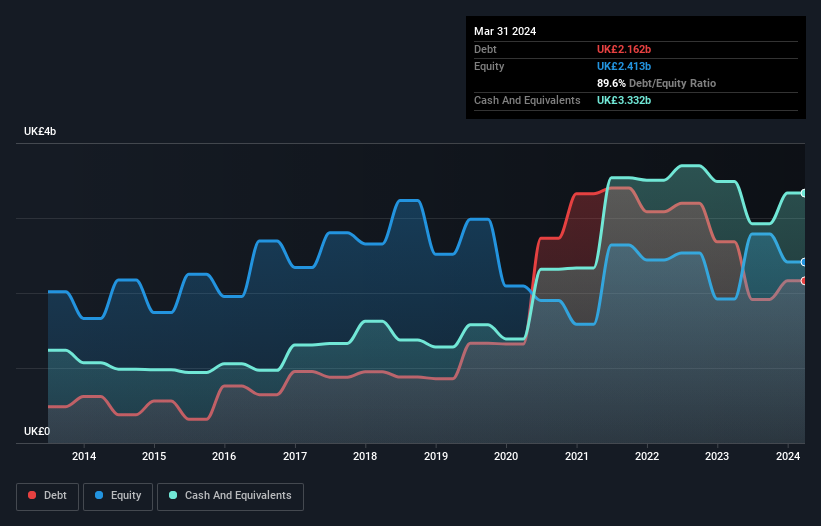Some say volatility, rather than debt, is the best way to think about risk as an investor, but Warren Buffett famously said that 'Volatility is far from synonymous with risk.' So it might be obvious that you need to consider debt, when you think about how risky any given stock is, because too much debt can sink a company. We can see that easyJet plc (LON:EZJ) does use debt in its business. But the real question is whether this debt is making the company risky.
When Is Debt A Problem?
Debt assists a business until the business has trouble paying it off, either with new capital or with free cash flow. In the worst case scenario, a company can go bankrupt if it cannot pay its creditors. However, a more common (but still painful) scenario is that it has to raise new equity capital at a low price, thus permanently diluting shareholders. Of course, the upside of debt is that it often represents cheap capital, especially when it replaces dilution in a company with the ability to reinvest at high rates of return. The first thing to do when considering how much debt a business uses is to look at its cash and debt together.
See our latest analysis for easyJet
What Is easyJet's Debt?
As you can see below, easyJet had UK£2.16b of debt at March 2024, down from UK£2.68b a year prior. But it also has UK£3.33b in cash to offset that, meaning it has UK£1.17b net cash.

How Strong Is easyJet's Balance Sheet?
The latest balance sheet data shows that easyJet had liabilities of UK£4.77b due within a year, and liabilities of UK£3.73b falling due after that. On the other hand, it had cash of UK£3.33b and UK£464.0m worth of receivables due within a year. So its liabilities outweigh the sum of its cash and (near-term) receivables by UK£4.70b.
Given this deficit is actually higher than the company's market capitalization of UK£3.50b, we think shareholders really should watch easyJet's debt levels, like a parent watching their child ride a bike for the first time. Hypothetically, extremely heavy dilution would be required if the company were forced to pay down its liabilities by raising capital at the current share price. Given that easyJet has more cash than debt, we're pretty confident it can handle its debt, despite the fact that it has a lot of liabilities in total.
Even more impressive was the fact that easyJet grew its EBIT by 447% over twelve months. If maintained that growth will make the debt even more manageable in the years ahead. There's no doubt that we learn most about debt from the balance sheet. But it is future earnings, more than anything, that will determine easyJet's ability to maintain a healthy balance sheet going forward. So if you want to see what the professionals think, you might find this free report on analyst profit forecasts to be interesting.
Finally, a business needs free cash flow to pay off debt; accounting profits just don't cut it. easyJet may have net cash on the balance sheet, but it is still interesting to look at how well the business converts its earnings before interest and tax (EBIT) to free cash flow, because that will influence both its need for, and its capacity to manage debt. Happily for any shareholders, easyJet actually produced more free cash flow than EBIT over the last two years. That sort of strong cash conversion gets us as excited as the crowd when the beat drops at a Daft Punk concert.
Summing Up
While easyJet does have more liabilities than liquid assets, it also has net cash of UK£1.17b. The cherry on top was that in converted 169% of that EBIT to free cash flow, bringing in UK£499m. So we are not troubled with easyJet's debt use. Of course, we wouldn't say no to the extra confidence that we'd gain if we knew that easyJet insiders have been buying shares: if you're on the same wavelength, you can find out if insiders are buying by clicking this link.
Of course, if you're the type of investor who prefers buying stocks without the burden of debt, then don't hesitate to discover our exclusive list of net cash growth stocks, today.
New: Manage All Your Stock Portfolios in One Place
We've created the ultimate portfolio companion for stock investors, and it's free.
• Connect an unlimited number of Portfolios and see your total in one currency
• Be alerted to new Warning Signs or Risks via email or mobile
• Track the Fair Value of your stocks
Have feedback on this article? Concerned about the content? Get in touch with us directly. Alternatively, email editorial-team (at) simplywallst.com.
This article by Simply Wall St is general in nature. We provide commentary based on historical data and analyst forecasts only using an unbiased methodology and our articles are not intended to be financial advice. It does not constitute a recommendation to buy or sell any stock, and does not take account of your objectives, or your financial situation. We aim to bring you long-term focused analysis driven by fundamental data. Note that our analysis may not factor in the latest price-sensitive company announcements or qualitative material. Simply Wall St has no position in any stocks mentioned.
About LSE:EZJ
Adequate balance sheet and fair value.
Similar Companies
Market Insights
Community Narratives





